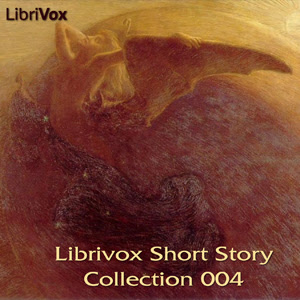LibriVox’s Short Story Collection Vol. 004 (Audio Book)
LibriVox’s Short Story Collection 004: a collection of 20 short works of fiction in the public domain read by a variety of LibriVox members.
Genre(s): Short Stories
Language: English
Group: Short Story Collection
CONTENTS
- The Bet by Anton Chekhov (1860-1904), read by William Coon - 00:17:50
- The Birth Mark by Nathaniel Hawthorne (1804-1864), read by Katy Preston - 00:38:08
- The Dilettante by Edith Wharton (1862-1937), read by William Coon - 00:24:29
- The Empty House by Algernon Blackwood (1869-1951), read by Efkan Efe - 00:39:35
- Eveline by James Joyce (1882-1941), read by William Coon - 00:11:38
- The Fulness of Life by Edith Wharton (1862-1937), read by Nikolle Doolin - 00:27:51
- The Ghosts by Lord Dunsany (1878-1957), read by William Coon - 00:11:55
- The Glamour of New Orleans by Lafcadio Hearn (1850-1904), read by Oscar Goff- 00:05:04
- The Idyl of Red Gulch by Bret Harte (1836-1902), read by Curtis Brown - 00:24:35
- Legend of the Bleeding-heart by Annie Fellows Johnston (1863-1931), read by Betsie Bush -00:15:54
- Long Distance by Edna Ferber (1885-1968), read by Eva - 00:14:14
- The Lost Sanjak by Saki (H. H. Munro) (1870-1916), read by David Barnes - 00:17:32
- The Masgue of Red Death by Edgar Allan Poe (1809-1849), read by Juan Carlos Bagnell - 00:16:00
- The Mass of Shadows by Anatole France (1844-1924), read by Peter Yearsley - 00:16:09
- An Occurrence at Owl Creek Bridge by Ambrose Bierce (1842-1914?), read by Matthew Stewart Fulton - 00:22:01
- The Quicksand by Edith Wharton (1862-1937), read by William Coon - 00:42:30
- The War Prayer by Mark Twain (1835-1910), read by Scott Henkel - 00:09:17
- What Was It? by Fitz-James O'Brien (1828-1862), read by Peter Yearsley - 00:35:13
- The Woman Who Tried to be Good by Fitz-James O'Brien (1828-1862), read by Eva - 00:29:40
- The Yellow Wallpaper by Charlotte Perkins Gilman (1860-1935), read by Justine Young - 00:28:18


No comments:
Post a Comment